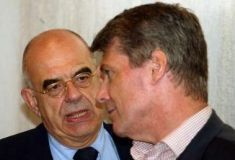Darfur peace talks deadline extended for two days
April 30, 2006 (ABUJ) — African Union mediators agreed on Monday to give warring parties in Sudan’s Darfur region an extra 48 hours to agree an AU-proposed peace deal after a midnight deadline expired.
 It followed a request from U.S. officials, who said the extra time would allow for agreement on two critical security issues — the disarmament of Janjaweed militia accused of rape, murder and looting, and the integration of rebel forces into the Sudanese security forces.
It followed a request from U.S. officials, who said the extra time would allow for agreement on two critical security issues — the disarmament of Janjaweed militia accused of rape, murder and looting, and the integration of rebel forces into the Sudanese security forces.
“We shall stop the clock for the next 48 hours so that the opportunity is used … by the parties to engage amongst themselves,” said Salim Ahmed Salim, chief AU mediator.
Two of the rebel groups said on Sunday they would refuse to sign the peace deal in its current form, throwing into doubt two years of talks to end fighting which has killed tens of thousands.
“We are not going to accept this document for signature unless there are fundamental changes made to the document,” Ahmed Tugod, the Justice and Equality Movement (JEM) chief negotiator, told Reuters.
The AU had set a midnight (2300 GMT) Sunday deadline to conclude the talks and said it would not reopen substantial negotiations on the proposed text.
The government of Sudan said earlier it was ready to sign the plan drafted by the AU mediators, but one of the factions of the Sudan Liberation Army (SLA) said it would not sign the proposed agreement unless its demands were met in full.
“If the proposal does not include all our demands we will not sign,” Seif Haroun, spokesman for the SLA faction led by Minni Arcua Minnawi, told reporters.
But the chief negotiator of the SLA Minni faction, Abduljabbar Dosa, left the possibility open that an agreement could be reached in the talks in the Nigerian capital Abuja.
“The position of the movement is not fixed the document needs to be enhanced. If it is enhanced then it is possible to make an agreement.”
It was not immediately known what the position of the other SLA faction — a third rebel group involved in the fighting — was on the 85-page draft peace settlement.
The draft agreement was the result of tough negotiations on security, wealth-sharing and power-sharing that have dragged on for two years while the conflict in Darfur has escalated.
WASHINGTON MARCH
In Washington, several thousand Americans, led by religious leaders, entertainers and politicians, marched to urge the United States to halt “genocide” in Darfur.
“Darfur deserves to live. We are its only hope,” Nobel Peace Prize winner and Holocaust survivor Elie Wiesel told the crowd. Other speakers included Illinois Democratic Senator Barack Obama and actor George Clooney, who visited Darfur last week.
The rebels said their objections to the agreement included the wording over how the Janjaweed would be disarmed, and concerns about political representation and compensation.
The rebels took up arms in early 2003 in ethnically mixed Darfur, an arid region the size of France, over what they saw as neglect by the Arab-dominated central government.
Khartoum used militias, known locally as Janjaweed and drawn from Arab tribes, to crush the rebellion. The fighting has killed tens of thousands of people while a campaign of arson, looting and rape has driven more than 2 million from their homes into refugee camps in Darfur and neighbouring Chad.
All sides have continued fighting despite a 2004 cease-fire, according to the AU, which has 7,000 peacekeepers in Darfur, and aid groups say violence prevents them from delivering food and medicine to tens of thousands of refugees.
(Reuters)
